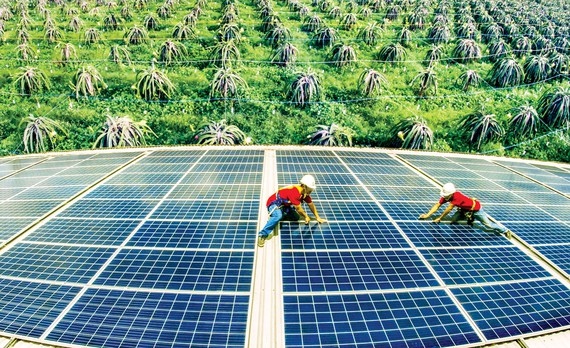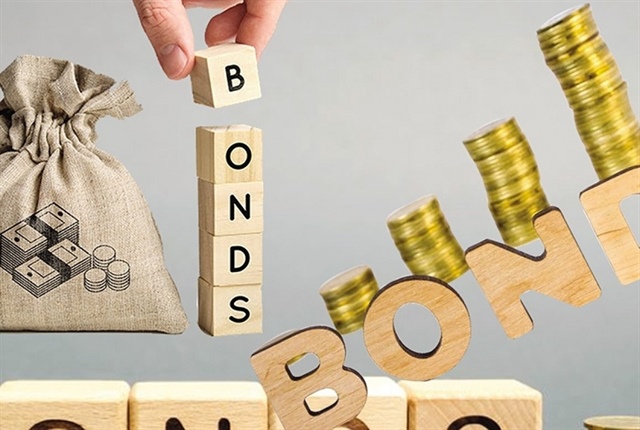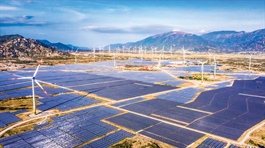Mass issuance of energy bonds under question
Mass issuance of energy bonds under question
Corporate bonds in the renewable energy sector were issued in huge amounts throughout 2021. This has raised many questions as to the actual financial capabilities of enterprises issuing such large amounts of Renewable Energy Corporate Bonds.
Illustrative photo. |
Asso. Prof. Dr. DINH TRONG THINH, an economist at the Academy of Finance, shared his views on this issue with Saigon Investment.
JOURNALIST: - Sir, will the current mass issuance of renewable energy corporate bonds throughout 2021 lead to some risks?
Dr. DINH TRONG THINH: - In 2021, besides the growth of bank bonds, securities, and real estate, there was a rapid growth of renewable energy corporate bonds. This is understandable, because at the moment renewable energy enterprises are in dire need of capital, as their own capital is limited and the ability to mobilize capital from credit institutions is also limited. Therefore, issuing new renewable energy corporate bonds helps in implementing new projects, and meeting the requirements for abolishing coal-fired power and other forms of fossil fuel energy sources.
What is of most serious concern here is the extent of risk involved. Renewable energy corporate bonds, like real estate bonds, are risky without any payment guarantor. A payment guarantor is an intermediary that accepts payment on behalf of the issuer if the issuer is unable to pay back, although this is a very rare occurrence. The underwriter only guarantees the company to sell all the shares. Renewable energy projects in Vietnam have recently developed very rapidly, and without any control, and the risk of default has now become very high indeed.
As of now, several solar power projects are currently in a dilemma, hence if they are deployed and exploited further, they will suffer huge losses. When they sell them back to the State Electricity Group (EVN) they may not even be sold, let alone see a profit. Even solar power in Ninh Thuan and Binh Thuan provinces cannot be sold because there are no power transmission lines, and investors are at risk of not being able to repay their debts. Wind energy, which is said to be under more preferential policies, also had many problems in the past. The return on investments of such projects is also long term.
Therefore, it is very difficult to repay the debt within a few years. If it follows the production cycle to generate interest, it can be upto tens of years before any profits can be seen. This contradicts the expectations of individual investors when most of them have little capital and only care for the interest rates, with a quick return on their capital investment. Therefore, when renewable energy corporate bonds are sold on the market today with a term of two to three years, there are many issues to pay attention to. When raising huge amounts of capital, it means there is a high possibility of default risk involved.
- Sir, there is a concern that the mass issuance of corporate bonds with the current high interest rates of 8% to 11% offered as bait, is because renewable energy enterprises are hiding their true financial capacity. What is your opinion on this?
- This can certainly happen. In fact, current regulations on corporate bond issuance are not strict at all. I know that in the past there were businesses that did not make much profit, but issued bonds that were dozens of times higher than the actual capital. This is risky for investors to buy.
Overseas, they have very clear regulations on the issuance of bonds by enterprises in the market, with specific rates and detailed appraisal, and strict control by the state. In fact, issuing corporate bonds is a form of debt. For instance, in New Zealand, Australia, Germany, Japan, and Spain, the overall ratio of debt to equity is 3:1. In Canada, this ratio is 2:1, in France and the US it is 1.5:1, and in China it is 2:1 for ordinary enterprises, and for banking and finance groups it is allowed to be 5:1.
In Vietnam, there is currently no clear regulation on this. Bond issuers have no credit rating, no collateral, no payment guarantor with a volume many times greater than the equity. Therefore, it is a very alarming situation, and potentially risky not only for investors but also for the financial and monetary system. Only a few small businesses default, and investor confidence in corporate bonds will immediately decline, and it will be difficult for businesses to raise capital through this channel. Also the contagion effect that caused many businesses to face the risk of bankruptcy, pushes the financial and monetary system into instability, and creates financial shocks.
- Sir, is it time to create a mechanism to control such types of bonds?
- Most of the enterprises investing in renewable energy today are not corporations with strong financial capacity or experience. Many businesses use high financial leverage, which increases risks for banks and investors. Many businesses also mobilize long-term capital by bonds to acquire lucrative renewable energy projects.
The risks so far have also begun to gradually reveal themselves. Investment capital depends too much on the corporate bond channel, while the revenue of most projects is only generated after many years, causing bond issuers to sometimes fall into the area of early bondholder interest payment, causing financial pressure earlier than the forecast revenue recognition period. Therefore, I think the authorities should have a monitoring mechanism for hot growing corporate bonds like renewable energy corporate bonds currently being sold, or at least have timely recommendations for would be investors for the future.
- Thank you very much.






















